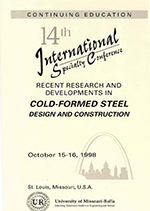Frequently Asked Questions Concerning the AISI Base Test and the Use of the AISI Anchorage Equations
Session Dates
15 Oct 1998
Abstract
The AISI Base Test Method was first introduced into the 1996 AISI Specification. Section C3.1.4 of the Specification provides a method for determining the nominal moment strength of a C- or Z- section under gravity load in the plane parallel to the web with the top flange supporting a standing seam roof system. A standing seam roof system is defined as a roof system in which the side laps between the roof panels or deck are arranged in a vertical position above the roof line, and the roof panel system is secured to the purlins by means of concealed hold down clips that are attached to the purlins with mechanical fasteners.
Department(s)
Civil, Architectural and Environmental Engineering
Research Center/Lab(s)
Wei-Wen Yu Center for Cold-Formed Steel Structures
Meeting Name
14th International Specialty Conference on Cold-Formed Steel Structures
Publisher
University of Missouri--Rolla
Document Version
Final Version
Rights
© 1998 University of Missouri--Rolla, All rights reserved.
Document Type
Article - Conference proceedings
File Type
text
Language
English
Recommended Citation
LaBoube, Roger A.; Murray, Thomas M.; Nunnery, Joe N.; and Fisher, James M., "Frequently Asked Questions Concerning the AISI Base Test and the Use of the AISI Anchorage Equations" (1998). CCFSS Proceedings of International Specialty Conference on Cold-Formed Steel Structures (1971 - 2018). 3.
https://scholarsmine.mst.edu/isccss/14iccfsss/14iccfsss-session5/3
Frequently Asked Questions Concerning the AISI Base Test and the Use of the AISI Anchorage Equations
The AISI Base Test Method was first introduced into the 1996 AISI Specification. Section C3.1.4 of the Specification provides a method for determining the nominal moment strength of a C- or Z- section under gravity load in the plane parallel to the web with the top flange supporting a standing seam roof system. A standing seam roof system is defined as a roof system in which the side laps between the roof panels or deck are arranged in a vertical position above the roof line, and the roof panel system is secured to the purlins by means of concealed hold down clips that are attached to the purlins with mechanical fasteners.



